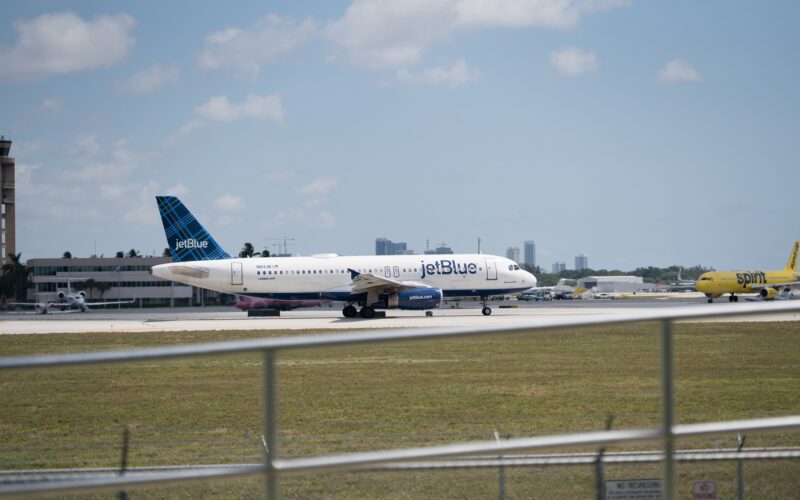When did DOJ last block an airline merger prior to the JetBlue-Spirit deal?

The United States Department of Justice (DOJ) recently announced that it would block JetBlue’s bid to merge with Spirit Airlines. However, this is not the first time the department has blocked a merger, having done so in the early 2000s and again in the 2010s.
On March 7, 2023, the DOJ, together with the Attorneys General of the Commonwealth of Massachusetts, the State of New York, and the District of Columbia, filed a lawsuit against JetBlue and its proposed acquisition of Spirit Airlines. The DOJ argued that the transaction, worth $3.8 billion, would eliminate competition and further consolidate “the United States airlines industry, the proposed transaction will increase fares and reduce choice on routes across the country, raising costs for the flying public and harming cost-conscious fliers most acutely.”
The day before the DOJ’s announcement, JetBlue, which anticipated that the department would attempt to block the merger, published a release indicating the “procompetitive benefits of combination with Spirit”. Citing “updated data”, the New York-based carrier indicated that it was three times as effective as Spirit Airlines in reducing fares on a route, calling it the “JetBlue Effect”.
“With the scale unlocked by combining with Spirit, JetBlue will be able to bring down legacy carrier fares on more routes, benefiting more travelers than if JetBlue and Spirit continued as standalone airlines,” read JetBlue’s release.
Still, the DOJ proceeded to file a lawsuit to block the merger.
“As our complaint alleges, the merger of JetBlue and Spirit would result in higher fares and fewer choices for tens of millions of travelers, with the greatest impact felt by those who rely on what are known as ultra-low-cost carriers in order to fly,” argued Attorney General Merrick Garland.
Furthermore, JetBlue wanted to further consolidate its position by entering into a Northeast Alliance with American Airlines, which the DOJ also sued to block, yet, according to the DOJ, “JetBlue is doubling down on consolidation, seeking to acquire and eliminate its main ultra-low-cost competitor, depriving travelers of yet another choice”.
“If allowed to eliminate the Spirit option, JetBlue would likely increase prices on every route where Spirit flies today,” the DOJ concluded.
Blocking US Airways mergers
But this is not the first airline merger the DOJ has blocked since the US airline market was deregulated by the Airline Deregulation Act of 1978.
In August 2013, the DOJ blocked a proposed merger between American Airlines and US Airways. At the time, the $11 billion merger was accused of lessening competition for commercial air travel and resulting in higher fares for passengers throughout the United States.
“By challenging this merger, the Department of Justice is saying that the American people deserve better. This transaction would result in consumers paying the price – in higher airfares, higher fees, and fewer choices,” Attorney General Eric Holder said at the time.
The DOJ then highlighted that American Airlines and US Airways directly competed on “more than a thousand routes where one or both offer connecting service, representing tens of billions of dollars in annual revenues”. If the merger were to proceed, four airlines would control “more than 80 percent of the United States commercial air travel market”.
However, despite the DOJ’s initial objections, the pair merged, creating the largest airline in the world. A deal was reached once the newly created entity agreed to sell off landing and takeoff slots as well as gates and associated ground assets at several airports across the US. American Airlines, the brand name that was set to continue following the merger, also committed to keeping hubs at several airports in the US.
Another US Airways merger was blocked in July 2001. This time, the airline attempted to unite forces with United Airlines, with the latter wanting to acquire the former. However, the DOJ argued that following the pair’s announcement in May 2000 and its own analysis, United Airlines would have a “monopoly or duopoly on nonstop service on over 30 routes, where consumers spend over $1.6 billion annually, and substantially limit the competition it faces on numerous other routes representing over $4 billion in revenues”.
The department also mentioned the fact that US Airways was United’s “most significant competitor” on routes between the two airlines’ hubs.
Despite the two carriers trying to propose remedy measures, the “proposal did not assure competition for those adversely affected by the acquisition, such as passengers in east coast connect markets, and instead substituted regulation for competition on some key routes and created competitive harms through United’s and American’s agreement to jointly fly and price the New York, Washington and Boston shuttle routes,” according to then Deputy Assistant Attorney General Hewitt Pate. This was the first airline merger to be blocked by the DOJ in the 21st century.
